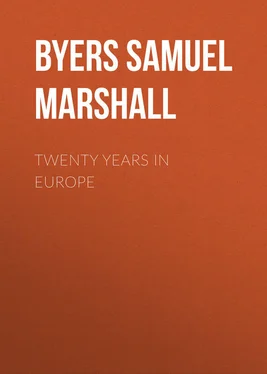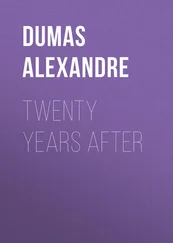Samuel Byers - Twenty Years in Europe
Здесь есть возможность читать онлайн «Samuel Byers - Twenty Years in Europe» — ознакомительный отрывок электронной книги совершенно бесплатно, а после прочтения отрывка купить полную версию. В некоторых случаях можно слушать аудио, скачать через торрент в формате fb2 и присутствует краткое содержание. ISBN: , Жанр: foreign_prose, foreign_antique, foreign_language, на английском языке. Описание произведения, (предисловие) а так же отзывы посетителей доступны на портале библиотеки ЛибКат.
- Название:Twenty Years in Europe
- Автор:
- Жанр:
- Год:неизвестен
- ISBN:http://www.gutenberg.org/ebooks/44296
- Рейтинг книги:4 / 5. Голосов: 1
-
Избранное:Добавить в избранное
- Отзывы:
-
Ваша оценка:
- 80
- 1
- 2
- 3
- 4
- 5
Twenty Years in Europe: краткое содержание, описание и аннотация
Предлагаем к чтению аннотацию, описание, краткое содержание или предисловие (зависит от того, что написал сам автор книги «Twenty Years in Europe»). Если вы не нашли необходимую информацию о книге — напишите в комментариях, мы постараемся отыскать её.
Twenty Years in Europe — читать онлайн ознакомительный отрывок
Ниже представлен текст книги, разбитый по страницам. Система сохранения места последней прочитанной страницы, позволяет с удобством читать онлайн бесплатно книгу «Twenty Years in Europe», без необходимости каждый раз заново искать на чём Вы остановились. Поставьте закладку, и сможете в любой момент перейти на страницу, на которой закончили чтение.
Интервал:
Закладка:
“I will never see her again,” he said to me long days afterward. “Like all beautiful, changing things, she has become a part of the beautiful universe. I know her breath will be in the perfume of the flowers, and she will linger in the summer wind.” He spoke in sincerity, but the beauty and poetry of his belief had little comfort for us, who also had lost, but with an absolute faith that we should find our buried one again.
In one of our little excursions, Professor Kinkel took us to see the celebrated actress, Caroline Bauer, now the Countess Plater. She and her husband, a rich Pole, who has good claims on the throne of Poland, live on an estate overlooking Lake Zurich. They received us all with great courtesy, and insisted on our having lunch with them on the terrace. The whole estate, not large, is surrounded by a high stone wall, and inside of that a line of trees and hedges higher still. The Countess is seventy, white haired, good looking, genial and happy as a girl. She played several airy things on the piano for us, and would have danced a jig, I think, had Professor Kinkel but said the word. In her heyday of beauty and fame she was the morganatic wife of the King of Belgium. But little was thought of that, for she showed us his picture hanging in the drawing-room, with pride. She and Kinkel talked and laughed much about things that were Greek to us. When we were leaving, the white-haired old beauty followed the white-haired old poet out to the garden gate, and gave him a good-by kiss. It was, in fact, a pretty and touching scene. The Count owns the great Castle of Rapperschwyl at the end of the lake. It contains a Polish museum. One Fourth of July, later, he invited all the Americans to celebrate the day there, and sent a steamer, with music and flags, to carry us up to his banquet. The flags of lost Poland were intertwined with the flags of the United States.
August, 1871. -Next to Westminster Abbey, in London, I have always wanted to see the St. Bernard pass, with its hospice and its dogs. At Martigny, the other day, my wife and I hired a man and a mule to help us up the pass that gave Bonaparte so much trouble. The man’s name was “Christ.” He often addressed the mule as “you diable.” We walked, rode and climbed past the most poverty-stricken villages in the Dranse valley I ever saw in my life. This should be called the valley of human wretchedness. We reached the famous stone hospice on the top of the pass late at night, in a storm of sleet, and tired to death. We had overtaken a German student on the way, and our poor mule had to drag or carry four of us up the worst part of the pass. The thunderstorm also made us overdo ourselves. My wife sat on the saddle; the student hung to the mule’s tail; I hung to one stirrup, and Christ to the other. I am glad it was dark, for the scene was not heroic, like that of Napoleon leading his army over the mountains.
The monks met us at the hospice entrance, and gave us places to rest for an hour. To me, who was utterly exhausted and used up, they gave drams of good, hot whisky.
An hour later they took us down to the Refectory, where we had a substantial supper of hot soup, bread, potatoes, omelets, prunes, and also wine. A fire blazed in the immense fireplace, for it is chilly and cold up here even in August. A wind was now blowing outside, and it was very dark. We were glad to sit around the fire with some of the monks and tell them strange things about the country we came from. One of them spoke English, a few of them German.
These zealous monks live up in this inhospitable pass solely to rescue and aid lost travelers. Thousands of poor men, seeking labor in better climates, walk over this pass to Italy every season. Many lose their way and are hunted up by the noble St. Bernard dogs; many freeze to death, and the monks have piled their unidentified bodies up out there in the stone dead-house. There is not enough soil on this rocky height for a grave. And the air is so rarefied that graves are not needed; the dead simply dry away at last, or, in their half-frozen condition, remain like unembalmed mummies. The high air is ruinous to health, and the monks after a few short years go down into the Rhone valley to die, while others for another little space take their places.
The next morning I climbed through an open window into the dead-house. The dead found on the pass during twenty years either lay on the floor or stood against the wall. It was a hideous spectacle, and yet numerous of the bodies were lifelike in every feature. They were placed in there just as they were found. All have the clothes on they wore when they were lost. Many are in the same attitude of despair and agony they had when the storm closed them in its icy embrace. I saw a man with form bent and arms extended as if groping to find his way. A dead woman sat in the corner with her frozen child in her arms. She has been there these dozen years. Some of the faces could yet be recognized had any friend in the world come to look at them.
After breakfast we had a play with a number of the noble dogs that have saved human lives on this pass, time and again. They were very large, mostly tawny colored, extremely intelligent and kind.
The devoted lives of these monks, and these dogs, is something pathetically noble.
A pretty chapel or church is built on to the hospice, and in there one sees a fine marble statue of Marshal Saxe, the hero of Marengo, put there by the order of Napoleon.
There are few large farms in Switzerland. Yet, we stayed last week at one that would do credit in size even to the United States-a couple of hundred acres, mostly given up to grass and stock; every foot as carefully looked after as if it were a gentleman’s lawn in London. The owner is what they call a rich Bauer. He is a romantic-looking character, the red-cheeked, burly man, as he goes about among his hired people in the picturesque costume of other days. His wife and daughter also dress in unique costume. They all look very striking on the green meadows away up here on a mountain side, half as high as the Rigi. All this peasant’s immediate ancestors were born in this old stone house, and, though he has grown rich here, his life is unchanged from theirs. There are many long, round-paned windows to the rooms, through which the sun pours in and warms the bright-colored flowers with which the window shelves are filled. An old eight-day clock of his grandfather’s stands in the corner counting the seconds for these two hundred years. There is not a carpet or a table cloth in the house, but in their stead are old chests, wardrobes and chairs of rare carving, and queer pewter mugs of another age are on the walls.
Their lives are very simple. At dinner they gather around an uncovered pine table, and the family dip soup from the same big bowl. They have an abundance of sour wine, black bread, and such butter, cheese and milk as would make an epicure glad.
The high mountain air about them is bracing; they seem happy and healthful, and, more than most peasants, enjoy the grand scene of Alps and lakes around them.
They set a little side table for us in another room, where we had all the good things a farm affords for two francs a day. Over on the Rigi, just across the lake from us, the tourists and the fashionables are paying ten to twenty francs for food not so wholesome.
October 9, 1871. -“Chicago has burned to the ground and all your houses are burned with it,” was the telegram that came to me for Brentano three nights ago. I went to his house at midnight, but he was gone to Freiburg. When he came back, he simply telegraphed, “Commence to rebuild at once.” The Americanism of the order set all his Swiss friends to talking. “Had Chicago burned up in Europe,” they said, “we would have spent a year mourning over it. Over there they simply rebuild the same day and say nothing.”
Читать дальшеИнтервал:
Закладка:
Похожие книги на «Twenty Years in Europe»
Представляем Вашему вниманию похожие книги на «Twenty Years in Europe» списком для выбора. Мы отобрали схожую по названию и смыслу литературу в надежде предоставить читателям больше вариантов отыскать новые, интересные, ещё непрочитанные произведения.
Обсуждение, отзывы о книге «Twenty Years in Europe» и просто собственные мнения читателей. Оставьте ваши комментарии, напишите, что Вы думаете о произведении, его смысле или главных героях. Укажите что конкретно понравилось, а что нет, и почему Вы так считаете.



![О Генри - Через двадцать лет [After Twenty Years]](/books/415401/o-genri-cherez-dvadcat-let-after-twenty-years-thumb.webp)








